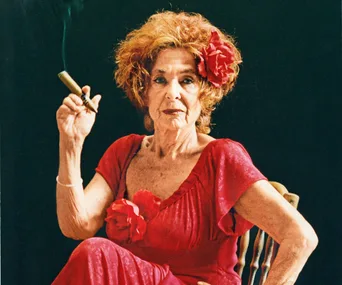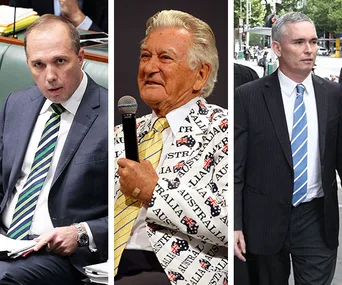Bob Hawke was as comfortable sculling a beer or telling a rude joke as he was debating policy and meeting foreign dignitaries. Australia’s Prime Minister from 1983 to 1991, a charismatic union leader and Rhodes Scholar, Bob Hawke was a quintessential larrikin Australian with a fierce intellect and pragmatic approach to politics.
It has now been reported that, on the eve of the election, Mr Hawke has died “peacefully” at his Sydney home at the age of 89. His widow Blanche D’Alpuget released a statement on Thursday evening.
She said: “Today we lost Bob Hawke, a great Australian – many would say the greatest Australian of the post-war era.
“He died peacefully at home at the age of 89 years.
“I and Bob’s children, Sue, Stephen, Rosslyn and stepson Louis, and his grandchildren, will hold a private funeral.”
Blanche added: “Bob was dearly loved by his family, and so many friends and colleagues. We will miss him.
“The golden bowl is broken.”
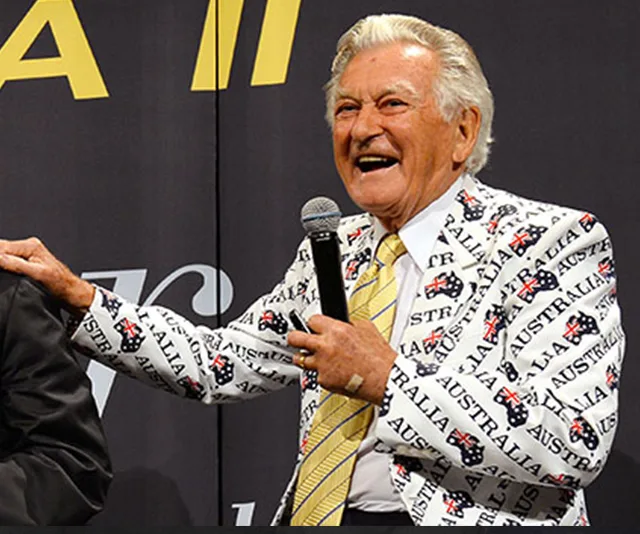
Bob Hawke was as comfortable sculling a beer or telling a rude joke as he was debating policy and meeting foreign dignitaries. (Image: Getty Images)
Who can forget that image of the Australian Prime Minister celebrating our America’s Cup win in 1983? Drenched in champagne and wearing a gaudy white jacket that shouted the word ‘Australia’, he declared “any boss who sacks anyone for not turning up today is a bum”.
Thirty years later, wearing the same famous jacket at an anniversary luncheon, he dropped the F-bomb in the punch line of a joke he told to Alan Bond, John Bertram and guests. The joke was about what it is to be an Australian.
But arguably, Bob Hawke did not need to rely on outside material for that subject. He lived it. He personified it.
In a famous profile of the man in 1977, journalist Craig McGregor wrote of the union leader: “He drinks like a fish, swears like a trooper, works like a demon, performs like a playboy, talks like a truckie – and acts like a politician … Bob Hawke is your typical Australian, oversize.”
BBC journalist Nick Bryant described Hawke during the 2007 election campaign, “‘g’daying’ and ‘hello darlinging’ his way around”, wearing “an electric blue sports jacket, an open-necked white shirt, even whiter leather loathers, no socks and a heavy gold chain that hung lazily from his sun-tanned neck.
“At a distance he could easily have been mistaken for a sales rep trying to sell retirement homes on the Gold Coast, but up close there was no doubting his presence.”
Hawke was born Robert James Lee Hawke on 9 December 1929 in Bordertown, South Australia. His father, Clem, was a Congregational minister and his mother, Ellie, was a schoolteacher with a fervent, almost messianic belief in her son’s destiny as a political leader.
It follows that he never lacked self-confidence, boasting at the age of 15 that he would one day lead the nation.
In 1939 Hawke’s 18-year-old brother Neil died from meningitis and some months later the family moved to Leederville, WA, where Bob’s father took up his new ministry.
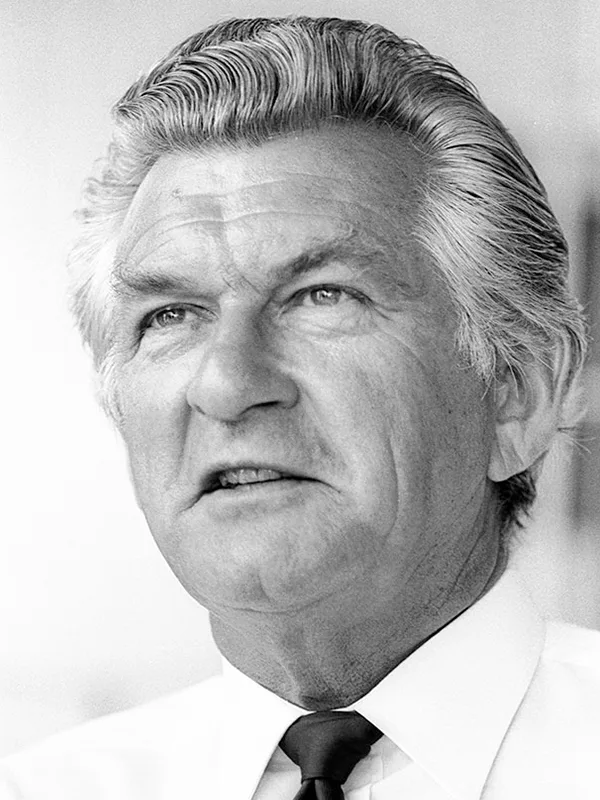
At just 15 years old, Bob boasted that he would one day lead the nation. (Image: supplied)
Hawke studied law and arts majoring in politics at the University of Western Australia. During this time he met a shorthand typist-bookkeeper called Hazel Masterton at a church fellowship Easter gathering. The couple were engaged in 1950. They agreed to a lengthy engagement so that Hawke could remain single and therefore eligible for a Rhodes scholarship, which he was awarded in 1953.
Hawke studied at Oxford University, completing a thesis on wage fixing in Australia, but his more famous achievement from the period was claiming the Oxford University College drinking record by drinking a “yard of ale” (2.5 pints of beer) in 11 seconds. It was a feat that he credited with contributing to his political success more than any other factor and at the age of 82 he was still getting up to his old antics, downing a schooner at the Sydney Cricket Ground in 2012 to the crowd’s delight.
For many years in-between however Hawke was a teetotaller, overcoming his alcoholism as he entered federal politics.
Bob and Hazel wed on March 3, 1956, and it would be a marriage that placed onerous demands on Hazel as Bob rose through union and Labor ranks and spent much of his time in Canberra.
WATCH: Former Prime Minister Bob Hawke shares an Aussie joke. Post continues…
Hawke went to work for the ACTU in 1957, soon becoming an advocate at the Arbitration Commission and was later elected President in 1969. His adept negotiation skills, natural charisma and preference for solving industrial disputes rather than instigating them ensured he was a well-liked figure. It wasn’t long before a move into politics was foreshadowed.
His drinking and philandering during this period are well documented, most notably, an affair with a young and glamorous writer called Blanche d’Alpuget whom he met briefly in 1970 and then again in 1976.
In her book On Longing, d’Alpuget writes, “With mutual, wordless consent it was agreed we would become lovers as soon as possible – which happened to be in a different city, the following night.” But she goes on “… slowly, dreadfully, I came to realise … that his love-life was a kind of freewheeling, decentralised harem, with four or five favourites and a shoe-sale queue of one-night stands.”
Hawke proposed to D’Alpuget in 1978 but reneged when it became clear that his career would suffer for it.
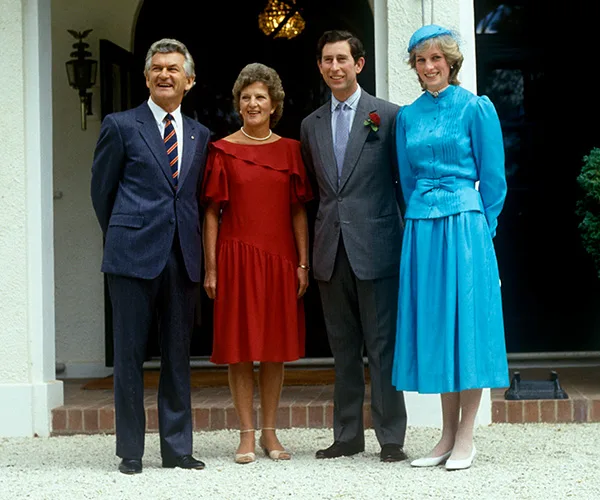
Bob and Hazel Hawke greet Prince Charles and Princess Diana on their royal tour of Australia in 1983. (Image: Getty Images)
He was elected MP for Wills in 1980, became Labor leader in ’83 and steered the party to victory at an election just a month after he took the reigns of leadership, putting Labor back into power and securing absolute authority within his party.
The greatest legacy of Hawke’s leadership is widely considered to be economic reform. His prime ministership oversaw the floating of the Australian dollar, deregulation of the financial system and massive reductions in tariffs despite Hawke’s union background.
These successes were the result of a partnership between Hawke and his Treasurer, Paul Keating, which descended into decades of feuding and bitterness that endured until Hawke died.
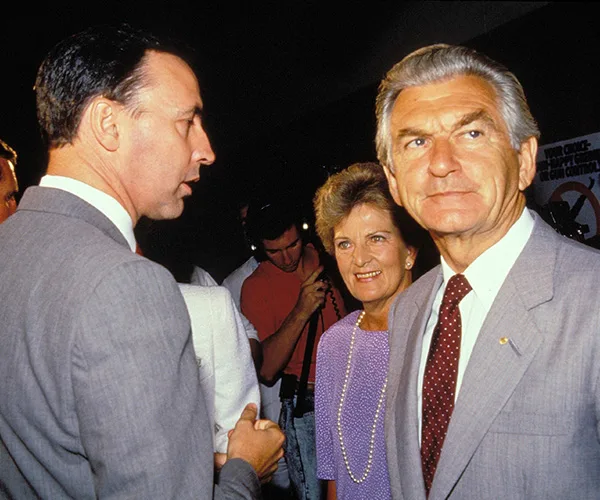
Bob Hawke and Paul Keating’s feuding continued until Hawke’s passing. (Image: Getty Images)
In 1988, in the wake of poor opinion polls and the 1980s recession, Keating put pressure on Hawke to step down. The two formed a so-called ‘Kirribilli agreement’ – where Hawke would stand down as leader shortly after the 1990 election.
But Hawke reneged on this agreement in response to what he saw as a disloyal speech by Keating, and the Treasurer resigned and challenged Hawke for the leadership. Keating succeeded on his second attempt, sending Hawke to the backbenches before resigning from Parliament on 20 February 1992.
Speaking to The Age newspaper 20 years after he became PM in 2003, Hawke nominated five areas where his greatest political legacies fall: the economy, bringing Australia together after the fracturing Fraser years, international relations particularly within Asia, fostering egalitarianism through social security reforms and focussing on year 12 retention rates, and the environment, most notably saving the Antarctic from mining exploration and drilling through an alliance with France and having large swathes of Australia recognised as World Heritage.
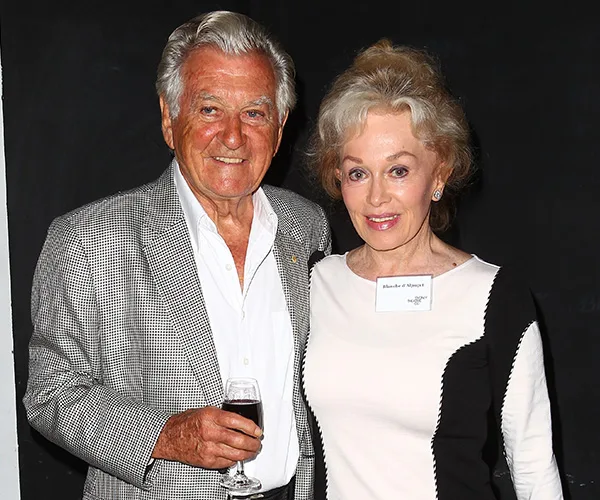
Bob married his second wife Blanche D’Alpuget in 1995. (Image: Getty Images)
Hawke divorced his wife Hazel in 1995 and married D’Alpuget the same year. They remained a devoted couple until his death.
His later years were spent in directorships and consultancy positions, maintaining involvement in politics as an advisor and mentor, as well as offering his endorsements from time to time.
He is survived by his second wife, Blanche, and his three children from his first marriage, Susan, Stephen and Rosslyn.
